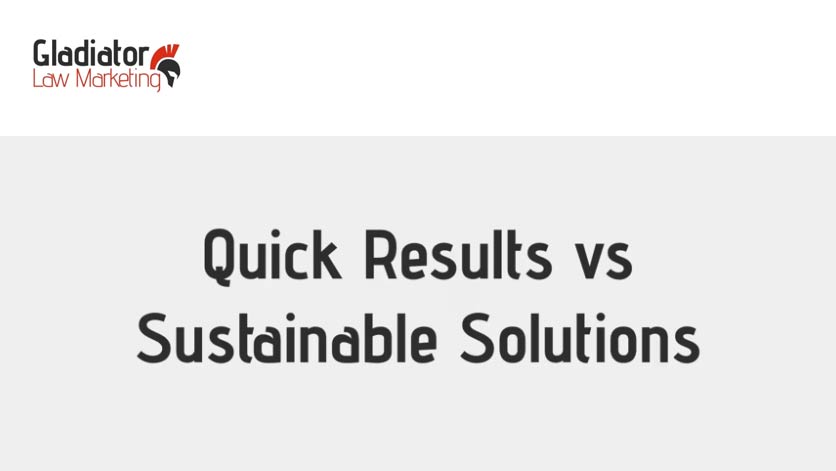

LAWYER MARKETING ARTICLES
How To Write Exceptional Law Firm Blogs

Roughly 57% of people search on their own for a lawyer, and younger clients are very concerned about a law firm’s online presence, according to Attorney at Work. That means your law firm needs to be visible and active in the digital world. In addition to having a website, one of the best ways to boost your online authority is to regularly generate a newsy, informative law firm blog. A marketing agency can do this for you, or an attorney at your firm who likes to write can also pen your blog.
Potential clients are always searching for information online, so why not coax them to land on your website when researching a legal topic? An informative, educational blog can teach readers about legal topics, inform them when laws change, and analyze current events from a legal perspective. A well-crafted legal blog not only informs readers about legal topics but also serves double duty as an effective marketing tool for your law firm.
The key is to have a system and techniques that make creating a blog relatively effortless, whether you publish one every month or every couple of weeks. Read on to discover essential tips for how to write exceptional law firm blogs.
AI-Assisted Blog Writing
There’s lots of chatter currently about the use of AI in writing content including blogs and other marketing materials for law firms. AI can be a useful assistive tool, though it’s not recommended that AI be used to create 100% of every individual piece of content. Instead, human-assisted” AI can be a time-saving and cost-effective approach to blogging. This means that AI is used along with a human writer to collaboratively create informative, thought-provoking legal writing. Lawyers can successfully use AI to:
- Create sections of content on a single idea that a writer can then edit and humanize.
- Gather information online that a writer can weave into paragraphs.
- Generate content for sections of an outline that a writer has first constructed.
One of the keys to using AI effectively in writing is the ability to create “prompts,” which are phrases and/or questions given to AI that cause it to initially generate the content. The more accurate and detailed the prompt, the more sophisticated and on-point the AI-generated content will be. There’s a real skill to creating prompts, and it can take some practice to become proficient at it.
Prompting Tips from ChatGPT for Attorneys
Here are a few tips from ChatGPT to help attorneys improve their prompts when using an AI content tool:
More Tips from ChatGPT for Attorneys (Includes Examples)
- Be Specific and Detailed: Provide clear and detailed information about what you’re asking.
- Define the Desired Format: If you have a preference for the format of the response (such as a list, a detailed explanation, bullet points, a dialogue, etc.), specify this in your prompt.
- State the Purpose or Goal: Clarify the intended use or the goal of the information you’re seeking. For instance, are you looking for a summary, an analysis, creative ideas, or factual information?
- Iterate and Refine: If your first prompt doesn’t yield the desired result, don’t hesitate to refine and try again. Iterative prompting can help hone in on the exact response you’re seeking.
Blog Writing: Do These Things…
1. Write on a topic that you think your typical client wants to know about.
Every law firm has its key practice areas that generate the bulk of their revenue. While you don’t always have to write on topics related to your revenue generators, it’s a good idea to keep these in mind. Also, time and experience have taught you the key questions that the majority of clients want answers to. These can be a great starting point when making a list of blog topic ideas. An obscure legal concept is not the best choice for a blog topic. Talk about the things that bring clients to your door.
Question-and-answer formatting can work wonders for legal blogs. Choose top questions among clients about a legal topic and provide answers in a Q&A format. For example: A personal injury firm specializing in car crashes may address common concerns about taking an insurer’s first offer. Likewise, a family law firm’s blog may address questions concerning child support and property division.
2. Discuss current events by filtering relevant news stories through a legal perspective.
Your clients may assume that happenings in Washington, D.C., or their state legislature have minimal impact on their daily lives. In reality, these developments are crucial — especially from a legal perspective. Your blog should call attention to important stories but go beyond the surface-level examination readers might find on the evening news. Instead, explain the impact recent developments might have on your area of law.
3. Incorporate video.
Internet users spend one-third of their time online watching video. Experts anticipate that users will grow even more dedicated to video in coming years. Embrace this trend by incorporating relevant videos into your blog. Consider developing brief clips specifically for each post. In addition to improving blog traffic, this could provide valuable content to share on your firm’s YouTube channel or Facebook page.
Example Topic-Specific Videos4. Use bulleted or numbered lists for succinct, effective communication.
Readers like quick bites of information that are easily digestible. What better way to achieve this than through bulleted lists? We’re not talking about long lists – just lists that include 4 to 6 key ideas that will stick in readers’ minds. You will attract loyal readers if you establish a reputation for quick, relevant information that is actionable. Bullets are an easy trick when considering how to write exceptional law firm blogs.
5. Spotlight charitable partnerships.
Charitable efforts generate considerable goodwill for law firms. Make the most of your practice’s latest charitable campaign by highlighting your efforts on your blog. Dedicate a full blog post to your charity of choice and why you’ve chosen to lend your support. Follow with occasional updates, such as results from fundraising events. Blog posts can also encourage clients to get involved with your favored charity.
6. Include calls to action (CTAs) with your phone number.
Don’t leave a reader hanging who wants to know more but can’t easily find a way to contact you. Use a sentence – or better yet, a colorful button – to provide your phone number and one-click contact with your firm. Reference your chat option, your contact form, or other means of quickly getting hold of you. Seize the moment and make it easy for a reader to act on the impulse to get more information. If they have to search for a way to contact you, you may lose them forever.
7. Make sure your blog is “scannable” with headings, subheadings, and short paragraphs.
Readers who have little time or are on the go may only scan your blog, making quick note of key points and ideas. So, use headings that are informative and compelling to break up text. The headings may be the only things some users read. For other users, compelling headings enable them to skip sections they’re not interested in and drill down into sections that pique their interest. Also, this isn’t a term paper or legal brief. Long, hefty paragraphs can be intimidating and turn readers off. Keep it short, lively and to the point.
8. Optimize key words for SEO effectiveness.
This is a bit technical but oh-so-important. Google algorithms are tiny brains that use all sorts of numerical calculations to decide which blogs/websites/bits of information Google lists on the first page of results to answer user queries. You want to be high on that list. You achieve this by optimizing for key words and phrases. If you don’t know a lot about SEO, talk to someone who does. SEO effectiveness is essential when considering how to write an exceptional law firm blog.
9. Include a hyperlink to your home page/practice area page so a reader can quickly click to your website.
What’s the use of attracting a reader if they don’t eventually wind up on your website to find out more about you and your services? After all, the goal here is to convert readers into leads, and leads into clients.
10. Maintain brand consistency.
Readers should know what to expect from your blog before they even glance at its content. Your brand should be consistent in all marketing efforts because clients find fragmented marketing messages disorienting or even suspicious. From logo to formatting and even image selection, every aspect of your blog should appeal to your target demographic. Language is just as important; it would be foolish to use similar phrasing for a large corporate law firm and a boutique family firm.
Blog Writing: Don’t Do These Things…
1. Don’t be general. Write on a single topic.
If you want to stand out, don’t ramble through generalities. Choose a single topic and stick to it. As legal readers go, they often have a question that they’re trying to find an answer to. They’re not a casual reader enjoying a book at the beach. So be sharp, relevant, and give them a legally informed answer.
2. Don’t give legal advice.
State clearly that this blog is just for informational purposes and is not meant to constitute legal advice. Not only can you mention this conversationally in the text, but you can also include a formal disclaimer at the bottom of each blog.
3. Don’t be too wordy or get down in the legal weeds.
Generally, legal blogs are effective if they’re 800 to 1,200 words. Expecting anyone to read further is asking a lot of today’s busy consumers. Be sure to explain things in layman’s terms rather than getting down into the nitty gritty of legal jargon or multiple case citations. If a reader wants complicated details, they can click on your website or give you a call. It’s an important balance to strike between superficial generalities and snoozy minutiae. Remember that you’re the one with expertise, so write a blog conversationally, like you’d talk to a client in your office.
More AI Tips & Examples for Attorneys
ChatGPT offers the following prompting suggestions for personal injury and criminal defense attorneys looking to use AI Large Language Models (LLMs) to assist with blogging.
Use AI to Brainstorm Topics
- Focus on Client Concerns and Questions: Prompt the AI to generate topics based on common questions or concerns of clients in your practice area. For instance, “What are the top five questions clients ask about DUI defense?” or “What concerns do personal injury clients have regarding insurance settlements?”
- Highlight Lawyer Expertise and Experience: Prompt the AI to come up with blog titles that showcase your expertise and experience in the field. For instance, “Create titles highlighting a criminal defense lawyer’s experience in handling complex drug offense cases.”
- Address Misconceptions and Legal Myths:Use prompts that aim to clear up common misconceptions or myths in your area of law. For example, “List potential blog titles that debunk myths about personal injury claims.”
Ask AI to Assist with a Portion of Content
Remember, AI can be a useful assistive tool, though it’s not recommended that AI be used to create 100% of every individual piece of content. But you might ask ChatGPT or other model to assist with a specific portion of your blog flow. An AI chatbot like ChatGPT can be a valuable tool for personal injury or criminal defense attorneys in enhancing their blog content. Here are three specific ways it can assist:
- Content Editing for Clarity and Readability: The AI can review and edit a portion of the blog post to ensure it is clear, concise, and easily understandable for a general audience. It can simplify legal jargon, improve sentence structure, and enhance overall readability.
- Enriching Content with Relevant Statistics and Data: The AI can supplement attorney-written content with up-to-date statistics, relevant case studies, or recent research findings. This can add depth and credibility to the blog post, providing readers with a well-rounded understanding of the topic.
- Enhancing Persuasiveness of the Content: The AI can make suggestions on restructuring or rephrasing portions of the content to make it more persuasive, especially when addressing potential clients like injured workers. This involves highlighting key arguments, using compelling language, and ensuring the content aligns with the reader’s interests and concerns.
In each of these roles, the AI chatbot serves as a versatile assistant, enhancing the quality and impact of the blog content while allowing the attorney to maintain their expert voice and perspective.
Need Help? Gladiator Is Here for You.
Part of our job at Gladiator Law Marketing is educating clients on how to market themselves effectively and affordably. We try to provide Gladiator Law Marketing blogs that are educational and inspiring. We also give our clients guidance to ensure their online content stands out from the crowd. If you don’t have time to write your law firm blogs, we can do it for you. We have years of experience in knowing how to write outstanding law firm blogs. To find out more about our comprehensive legal marketing services, call us for a free consultation at 1-888-683-3212.




